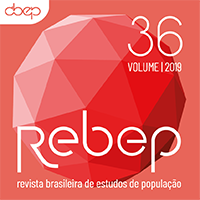ICPD 25: Uninhabitable Earth and the outcry of youth
DOI:
https://doi.org/10.20947/S0102-3098a0085Keywords:
Population and sustainable development, ICPD, Agenda 2030, Climate emergencyAbstract
The end of the Cold War, the collapse of the Soviet Union, the German unification, the formation of the European Union and the economic emergence of China and India ushered in a time of collaboration and hope for progress in the international order in the last decade of the turbulent twentieth century. The Cairo International Conference on Population and Development (ICPD) in 1994 benefited from this favorable global climate and presented a Program of Action with an optimistic view of the triple relationship between population, development and nature, foreshadowing a world of economic and social progress, respect for the environment and expansion of Human Rights. However, the multiple material achievements and improvements in various social indicators have come at the expense of the impoverishment of the ecosystems and the planet’s climate imbalance. The dream of sustainable development has generated nightmares, especially among the younger generations, who are taking the streets to denounce the empty promises and the growing likelihood of an ecological apocalypse looming on the horizon. These are the issues that will be addressed in this technical note, at a time when the Nairobi Summit on ICPD25 is being organized.
Downloads
References
ALVES, J. E. D.; CORRÊA, S. Demografia e ideologia: trajetos históricos e os desafios do Cairo + 10. Revista Brasileira de Estudos de População, v. 20, n. 2, p. 129-156, jul./dez. 2003.
ALVES, J. E. D. Sustentabilidade, aquecimento global e o decrescimento demoeconômico. Revista Espinhaço, v. 3, n. 1, p. 4-16, 2014.
ALVES, J. E. D. ‘BirthStrike’ e ‘NoFutureNoChildren’: greve de nascimento e emergência climática. Ecodebate, 09/10/2019.
BOULDING, K. The economics of the coming spaceship Earth. In: JARETT, H. (ed.). Environment quality in a growing economy. Baltimore: Johns Hopkins University Press, 1966.
DALY, H. Economics for a full world. Scientific American, n. 293, p. 100-107, Sep. 2005.
GEORGESCU-ROEGEN, N. The entropy law and the economic process. Cambridge, MA: Havard University Press, 1971.
FAO. The state of food security and nutrition in the world: safeguarding against economic slowdowns and downturns. Rome: FAO, 2019. Disponível em: http://www.fao.org/3/ca5162en/ca5162en.pdf.
FIGUERES, C. et al. Three years to safeguard our climate. Nature, v. 546, p. 593-595, 29 June 2017.
IPCC. Global warming of 1.5 °C. 2018. Disponível em: http://www.ipcc.ch/report/sr15/.
IPCC. The ocean and cryosphere in a changing climate. Principality of Monaco, 2019.
KOLBERT, E. The sixth extinction: an unnatural history. London: Bloomsbury, 2015.
MARTINE, G.; ALVES, J. E. D. Economia, sociedade e meio ambiente no século 21: tripé ou trilema da sustentabilidade? Revista Brasileira de Estudos de População, v. 32, n. 3, p. 433-460, 2015.
MARTINE, G.; ALVES, J. E. D. Disarray in global governance and climate change chaos. Revista Brasileira de Estudos de População, v. 36, p. 1-30, 2019.
MARTÍNEZ-ALIER, J. Introducción a la economía ecológica. Barcelona: Rubes Editorial, 1999. (Cuadernos de Medio Ambiente).
NAÇÕES UNIDAS. Relatório da Conferência Internacional sobre População e Desenvolvimento. Cairo, 1994.
ROSLING, H.; ROSLING, O.; RONNLUND, A. R. Factfulness: ten reasons we're wrong about the world – and why things are better than you think. New York: Flatiron Books, 2018.
STEFFEN, W. et al. Planetary boundaries: guiding human development on a changing planet. Science, v. 347, n. 6223, p. 736-13, Feb. 2015.
STEFFEN, W. et al. Trajectories of the Earth System in the Anthropocene. PNAS, v. 115, n. 33, Aug. 2018.
SUMMERS, L. H. Secular Stagnation, IMF, Washington, 2015.
THUNBERG, G. Our house is on fire. The Guardian, 20 Jan. 2019.
THUNBERG, G. If world leaders choose to fail us, my generation will never forgive them. The Guardian, 23 Sep. 2019.
UNEP. Resource efficiency: potential and economic implications. A report of the International Resource Panel. March 2017.
UNITED IN SCIENCE. High-level synthesis report. UN Climate Action Summit, 2019.
WALLACE-WELLS, D. The uninhabitable earth: life after warming. New York: Tim Duggan Books, 2019.
WORLD COMMISSION ON ENVIRONMENT AND DEVELOPMENT. Our common future. New York: Oxford University Press, 1987.
WWF. Relatório Planeta Vivo – 2018: uma ambição maior. Gland, Suíça: WWF, 2018.
Downloads
Published
How to Cite
Issue
Section
License
Papers published in Rebep are original and protected under the Creative Commons attribution-type license (CC-BY). This license allows you to reuse publications in whole or in part for any purpose, free of charge, even for commercial purposes. Any person or institution can copy, distribute or reuse the content, as long as the author and the original source are properly mentioned.

